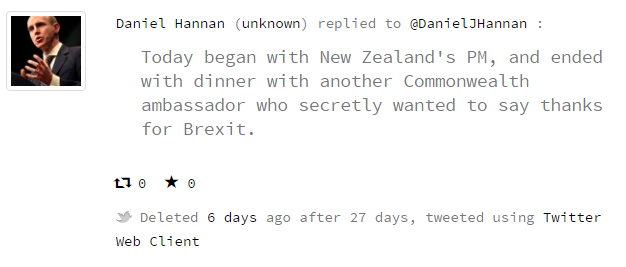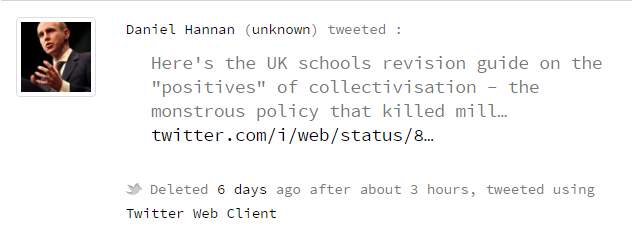
On Friday morning, in preparation for this piece, I went to Politiwoops, a website which archives politicians’ deleted tweets, to scan through the messages Daniel Hannan had quietly snipped from the record over the last few days. This morning, before writing up, I decided to check if he’d deleted any more since.
He had: by my count, 54 of them. Over the weekend, Daniel Hannan MEP found time to scrub nearly 20 tweets a day from history.
I don’t, in all honesty, quite understand the logic behind this. Lord knows I express some terrible opinion or another most days, and I’m demonstrably wrong about stuff all the time. (Seriously, my record at predicting elections recently has been 100 per cent wrong, a wrongness so complete that I’m almost proud of it.) But I’m not in the habit of deleting this stuff** because, well, why would I be? These are my opinions, no matter how terrible they may be, and the least I can do is stay true to them.
That said, it’s relatively easy for me to stand by my bad tweets, because I’m not a politician – let alone one with a reputation for wisdom, sagacity and not being embarrassingly wrong about things on an almost hourly basis. Daniel Hannan is a public figure – one with nearly 100,000 followers, indeed, the sort of vast audience which makes it all the more important that goes around pretending his is the Brexiteer Twitter account of record.
So what, you may wonder, is being wiped from the archive?

Before we get too far into this I should say that, to be scrupulously fair to the man, that “20 deletions a day” figure is just a tiny bit misleading. A lot of the deleted tweets – perhaps as many as half – are in fact deleted retweets. And there is an obvious reason why you would delete a retweet: so you can retweet it again.
I do this too (one of the few interests Daniel Hannan and I share is relentless self-promotion). So while it’s tempting to mock Hannan for his enthusiastic retweeting and re-retweeting of both his own columns and praise, I’m very much occupying a glass house of my own on this one.

But plenty of tweets have, nonetheless, gone missing without such an obvious explanation. Here are a selection.

The obvious reason for deleting this one would be: he didn’t. Lots of people say they’re quitting Twitter and then don’t because we are all, more or less, addicted.
There are two problems with this theory, however. One is that, in fact, he did: there are no tweets left in the record between Christmas Eve and 4 January, and best I can tell that’s not because he deleted all of them.
The other problem is that, even if he had failed, why would he wait nearly two months before deleting the only sign that he was even attempting it? Just quietly log in during the queen’s speech and do it then.
So, all we can really say here is that the ways of Hannan are mysterious to man, and move on with our lives.
This one is rather more explicable:

Oh my god would you look at this nonsense. Hannan’s response to Donald Trump’s Muslim ban – a policy which he himself opposes – was to tell the American left that they weren’t critical enough of Obama. The mystery isn’t why he deleted it, it’s why he ever saw fit to tweet something so obviously fucking stupid in the first place.
(Incidentally, I mocked this one in a previous column, so I’d like to think I could share the credit for this. The only problem is that Louise Mensch assured me this week that Hannan “doesn’t give a toss about [me] one way or the other”. And so, we are forced to assume that Hannan became aware of his own appalling crassness without any help from yours truly. Sad!)

Whatever could the former prime minister of Australia have been dead right about?

Yes, if I’d praised this, I’d probably have tried to cover up the evidence too.

This one’s a bit of a tangled web. It dates from mid January, so relates, one assumes, to the UK Supreme Court case about whether parliamentary authority would be needed to trigger Article 50.
Since then, though, President Trump has gone to war with the US judicial system, so the relationship between executive and judicial power has become rather murkier than even Edmund Burke ever bargained for. Under the circumstances, Hannan perhaps felt it prudent to steer clear of the whole debate, just in case.#
UPDATE: Law lecturer Paul Scott suggests another possible explanation for the deletion: it wasn’t Burke who said this at all, but Edward Coke. Good knowledge, Paul.

That’s another one that requires no explanation, isn’t it? The only real question is why he left it up there for all to see for 10 whole hours.
(Matt Ridley, incidentally, is the climate-change sceptic and science writer who, in another life, was chair of the Northern Rock bank. There’s probably a whole other column keeping track of the silly things he says, if anyone out there fancies the job.)

Here Daniel seems to have RTed the New Statesman’s own Sarah Ditum mocking him, then, mere moments later, thought better of it.
Why he thought better of it, history doesn’t record. Perhaps he was concerned about the risks of directing his army of followers towards one of his critics. Yes, that was probably it.

No. No, it’s not. Best delete that one before anyone notices you don’t know what you’re talking about, Dan.

For context here: Lord Finkelstein’s mother Mirjam was a friend of Anne Frank; she survived the Bergen-Belsen concentration camp.

This sounds like quite a good story – I mean, if I’d had that sort of a day, I’d probably be bragging about it too.
So why delete it? Who can say?

What Dan is referring to here – what you can’t see, because Politiwoops doesn’t store images – is a screenshot of a history text book, listing “the positive view” of collectivisation, a Soviet programme that caused mass famine. Hannan’s contention would seem to be that children are being taught that communism is A Good Thing.
This is obviously nonsense, as barrister George Peretz QC helpfully explains:
Another classic @DanielJHannan tweet. The selected excerpt, the insinuation: and its actual context. pic.twitter.com/g0I7Nk0m7k
— George Peretz QC (@GeorgePeretzQC) February 7, 2017
The point of the exercise, as is blindingly obvious to anyone who has thought about it for even 20 seconds, is not to teach kids that collectivisation was good. It’s to expose them to the arguments that said it was, to help them detect bullshit.
Alas, posterity doesn’t record what Nazi crimes Hannan was referring to here…

…but I certainly remember my GCSE history text books including extracts from Nazi propaganda, for the specific and obvious purpose of teaching us about the existence of propaganda.
Why Daniel Hannan might be uncomfortable that schools are teaching children how to detect and discard untrue statements from politicians is an interesting question.
These tweets, in particular, were widely shared, widely discussed, widely mocked. Peretz’s take down alone was RT-ed more than 500 times, and is still there awaiting more. All of which raises another big question about Hannan’s tweet-and-delete habits. To whit – what’s the point of them?
If you’re a random internet user with 200 followers and you say something stupid, you can probably get away with deleting it: hardly anyone will see it, and even those who do are incredibly unlikely to screenshot it first.
Daniel Hannan, though, is the big man of campus – 100,000 followers, hanging on his every word. When he tweets, his words will be seen. More than that, they’re extremely likely to generate screenshots. He can’t delete his mistakes – because people like George Peretz QC will record them for posterity.
So what are these deletions meant to accomplish? We know he said these things. We know he deleted them afterwards, and we know that he never lowered himself to tweet any explanation along the lines of, “Whoops! That was stupid of me, wasn’t it friends?” So what on earth are these purges meant to achieve?
I don’t have answers to these questions. So in the unlikely event that Louise Mensch was wrong, and you’re reading this, Daniel, please do write in. I would genuinely love to know.
**Case in point: midway through writing this I sent forth a smugly superior tweet about how this story was probably a stunt of some sort, rather than a genuine resignation letter – only to be met with a flood of eye-rolling responses pointing out that Waterford Whispers is, in fact, a sort of Irish Onion. I look and feel like a total tit, only I can’t delete it because I’m up here on my high horse about deleted tweets. FFS, Jonn.





